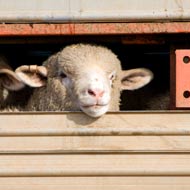MPs to debate live animal exports

Brexit presents an 'opportunity' to give port owners the flexibility to decide whether or not to allow this trade.
Port owners may be given the power to refuse live animal exports, as MPs are set to debate the issue in the House of Commons this week.
Craig Mackinlay, MP for South Thanet, introduced a bill in May that would remove obstacles in the law preventing councils from banning live exports. It is now scheduled for debate in the commons on Friday (4 November).
So far this year there have been 12 sailings of 58 lorries carrying around 20,000 sheep, according to the RSPCA. Another shipment is also reported to have left Ramsgate yesterday (31 October).
Currently the trade is legal as the UK is a member of the European Union. But the RSPCA says Brexit presents an 'opportunity' to give port owners the flexibility to decide whether or not to allow this trade.
The debate was triggered by the tragic events of September 2012, when dozens of sheep died or were euthanised at the Port of Ramsgate. The AHVLA (now APHA) found the vehicle in question had been poorly loaded and overstocked, resulting in six lambs falling into the water when the floor collapsed. One sheep had a broken leg and many more were lame or had trapped limbs.
Thanet District Council suspended further shipments for a period of time as a consequence, but was later found to have breached an 1847 law and ordered to pay compensation of more than £4million.
David Bowles, head of the RSPCA's public affairs, said: "We know that port owners such as Thanet Council, and their constituents do not want the trade….
"Brexit gives them the opportunity to choose and we hope MPs and the government will recognise this in the debate."
An open letter calling on farming minister George Eustice to support changes in the law has been signed by over 75,000 people.



 The Federation of Independent Veterinary Practices (FIVP) has announced a third season of its podcast, Practice Matters.
The Federation of Independent Veterinary Practices (FIVP) has announced a third season of its podcast, Practice Matters.